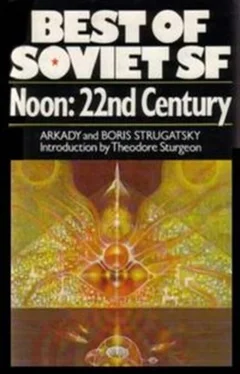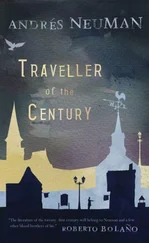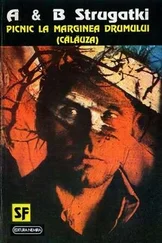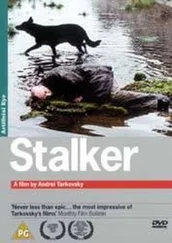He ordered the observation post to be set up between the knoll and the melon field. The Egg could easily be seen from there—a silvery ball on the rust-colored slope under the dark-blue sky. Sidorov sent Sorochinsky over to the archaeologists, then sat down in the grass in the shade of the pterocar. Galtsev was already dozing, sheltered from the sun by the wing. Sidorov sucked on a fruit drop, looking sometimes at the top of the knoll, sometimes at the strange triangular cloud in the west. Finally he got out the binoculars. As he expected, the triangular cloud turned out to be the snowy peak of a mountain, perhaps a volcano. Through the binoculars he could see the narrow shadows of thawed patches, and could even make out snow patches lower than the uneven white edge of the main mass. Sidorov put down the binoculars and began to think about the embryo. It would probably hatch from the Egg at night. This was good, because daylight usually interfered with the operation of the movie cameras. Then he thought that Sermus had probably thrown a fit with Fischer, but had nonetheless started off for the Sahara. Then he thought that Mishima was now loading at the spaceport in Kirghizia, and once again he felt an aching pain in his right side. “Not getting any younger,” he muttered and glanced sidelong at Galtsev. Galtsev lay face down, with his hand under his head.
Sorochinsky returned in an hour and a half. He was shirtless, his smooth, dark skin shiny with sweat. He was carrying his foppish suede jacket and his shirt under his arm. He squatted down in front of Sidorov and, teeth agleam, related that the archaeologists thanked them for the warning and found the test very interesting, that there were four of them, that schoolchildren from Baikovo and Severokurilsk were helping them, that they were excavating underground Japanese fortifications from the middle of the century before last, and, finally, that their leader was a “ve-ry nice girl.”
Sidorov thanked him for this fascinating report and asked him to see about dinner, then sat down in the shade of the pterocar and, nibbling a blade of grass, squinted at the distant white cone. Sorochinsky woke up Galtsev, and they wandered off to the side, talking softly.
“I’ll make the soup, and you do the main dish, Viktor,” said Sorochinsky.
“We’ve got some chicken somewhere,” Galtsev said in a sleepy voice.
“Here’s the chicken,” said Sorochinsky. “The archaeologists are fun. One has let his beard grow—not a bit of bare skin left on his face. They’re excavating Japanese fortifications from the forties of the century before last. There was an underground fortress here. The guy with the beard gave me a pistol cartridge. Look!”
Galtsev muttered with displeasure, “Please, don’t shove it at me—it’s rusty.”
The odor of soup wafted up.
“That leader of theirs,” Sorochinsky continued. “What a nice girl! Blonde and slender—except she’s got fat legs. She sat me down in the pillbox and had me look through the embrasure. She says they could cover the whole northern shore from there.”
“Well?” asked Galtsev. “Did they really shoot from there?”
“Who knows? Probably. I was mostly looking at her. Then she and I started measuring the thickness of the ceiling.”
“So you were measuring for two hours?”
“Uh-huh. Then I realized she had the same last name as the guy with the beard, and I cleared out. But let me tell you, it’s really filthy in those casemates. It’s dark, and there’s mold on the walls. Where’s the bread?”
“Here,” said Galtsev. “Maybe she’s just the guy with the beard’s sister?”
“Could be. How’s the Egg coming?”
“No action.”
“Well, all right,” said Sorochinsky. “Comrade Sidorov, dinner’s ready.”
Sorochinsky talked a lot as he ate. First he explained that the Japanese word for pillbox, tochika, derived from the Russian og-nevaya tochka, “firing point,” while the Russian word for pillbox, dot, though assumed by the ignorant to be an acronym for dolgov-remennaya ognevaya tochka, “permanent firing point,” must really come from the English “dot,” which meant “point.” Then he began a very long discourse on pillboxes, casemates, embrasures, and density of fire per square meter, so that Sidorov ate quickly, refused any fruit for desert, and left Galtsev to watch the Egg. He got into the pterocar and began to drowse. It was surprisingly quiet, except that Sorochinsky, while washing the dishes in a stream, would every so often break out singing. Galtsev was sitting with the field glasses, his eyes glued to the top of the knoll.
When Sidorov awoke, the sun was setting, a dark-violet twilight was crawling up from the south, and it had gotten chilly. The mountains to the west had turned black, and now the cone of the distant volcano hung over the horizon as a gray shadow. The Egg on the hilltop shone with a scarlet flame. A blue-gray haze had crawled over the melon fields. Galtsev was sitting in the same pose listening to Sorochinsky.
“In Astrakhan,” Sorochinsky was saying, “I once had ‘Shah’s rose,’ a watermelon of rare beauty. It has the taste of pineapple.”
Galtsev coughed.
Sidorov sat for a few moments without moving. He remembered the time he and Captain Gennady had eaten watermelons on Venita. The planetological station had gotten a whole shipload of watermelons from Earth. So they ate watermelon, ate their way into the crunchy pulp, the juice running down their cheeks, and then they shot the slippery black seeds at each other.
“… lip-smacking good, and I say it as a gastronome.”
“Quiet,” said Galtsev. “You’ll wake up Athos.”
Sidorov arranged himself more comfortably, laying his chin on the back of the seat in front of him and closing his eyes. It was warm and a bit stuffy in the pterocar-the passenger compartment was slow to cool.
“Did you ever ship out with Athos?” Sorochinsky asked.
“No,” said Galtsev.
“I feel sorry for him. And I envy him at the same time. He’s lived through a life such as I’ll never have. I and most other people. But still, it’s all behind him now.”
“Why exactly is it all behind now?” asked Galtsev. “He’s just stopped spacing.”
“A bird with its wings clipped…” Sorochinsky fell silent for a moment. “Anyhow, the time of the Assaultmen is over,” he said unexpectedly.
“Nonsense,” Galtsev answered calmly.
Sidorov heard Sorochinsky start moving around. “No, it’s not nonsense,” Sorochinsky said. “There it is, the Egg. They’re going to build them by the hundreds and drop them on unexplored and dangerous worlds. And each Egg will build a laboratory, a spaceport, a starship. It’ll develop mine shafts and pits. It’ll catch your nematodes and study them. And the Assaultmen will just gather data and skim off the cream.”
“Nonsense,” Galtsev repeated. “A laboratory or a mine shaft is one thing—but an airtight dome for six people?”
“What bothers you—the airtight part?”
“No—the six people who’ll be under it.”
“It doesn’t matter,” Sorochinsky said stubbornly. “It’s still the end of the Assaultmen. A dome for people is only the beginning. They’ll send automatic ships ahead to drop the Eggs, and then when everything is ready the people will come.”
He began to talk about the prospects of embryomechanics, paraphrasing Fischer’s famous report. A lot of people are talking about it, thought Sidorov. And all that is true. But when the first drone intrasystem craft had been tested, there had also been much talk about how all spacemen would have to do was skim off the cream. And when Akimov and Sermus had launched the first cyberscout system, Sidorov had even been on the point of giving up space. That had been thirty years before, and since that time more than once had had to jump into hell behind swarms of robots gone haywire, and to do what they could not. A greenhorn, he thought again about Sorochinsky. And a blabbermouth.
Читать дальше












